Reflective Essay on Academic Skills and Future Business Application
VerifiedAdded on 2023/01/19
|7
|1550
|79
Essay
AI Summary
This reflective essay explores the application of academic skills in a business environment. The essay delves into the importance of teamwork, presentation skills, and verbal communication, drawing upon theoretical frameworks such as Kolb's experiential learning cycle and Belbin's team role theory. The student reflects on their experiences during the module, analyzing how these skills can be utilized in future job roles. The essay includes an action plan for improvement, focusing on enhancing professional communication, conflict management, and leadership skills. The student also examines presentation skills and verbal communication, discussing how these skills can be honed through practice and the application of communication models like Mehrabian's. The conclusion emphasizes the importance of reflective practice for personal and professional growth.
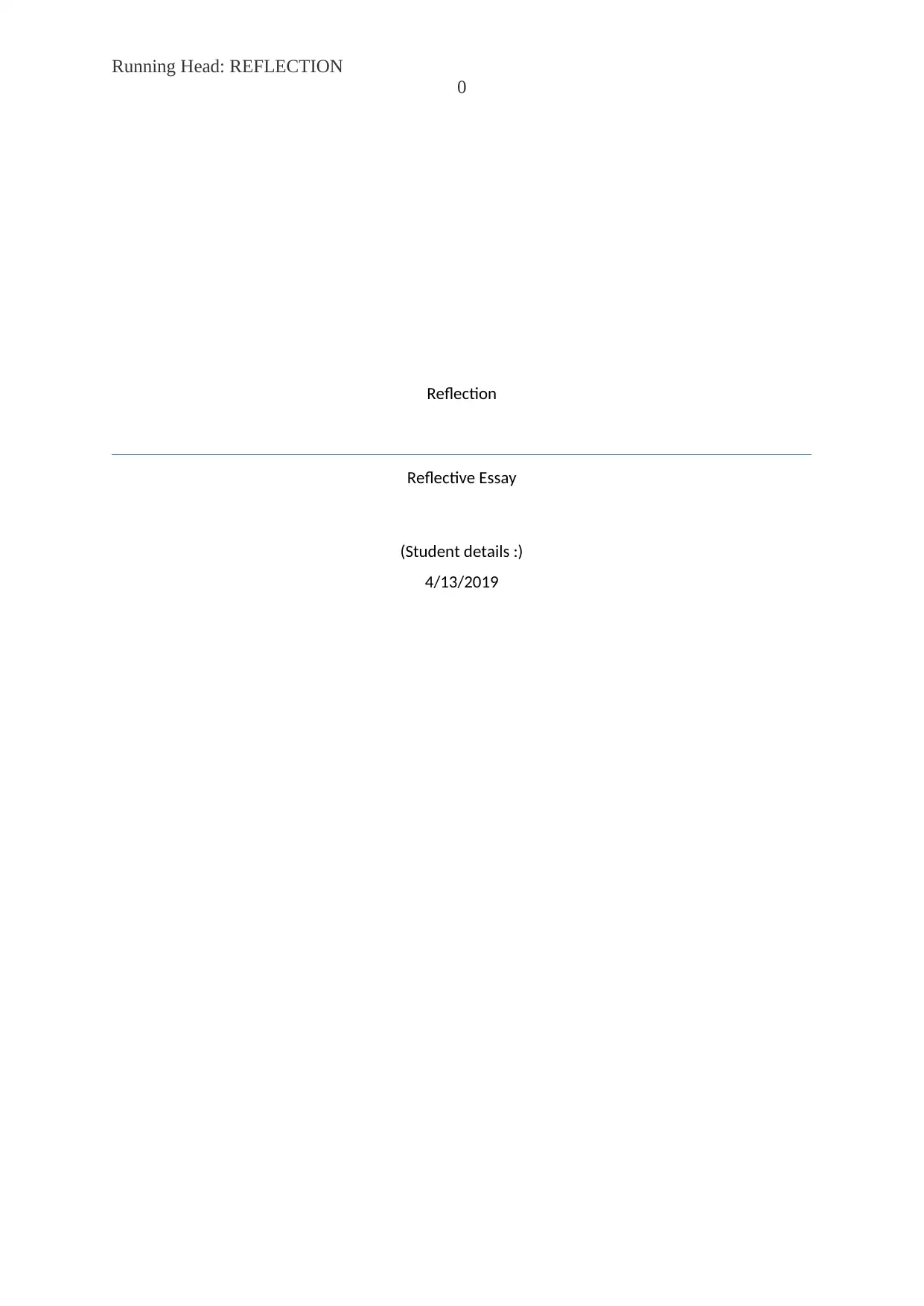
Running Head: REFLECTION
0
Reflection
Reflective Essay
(Student details :)
4/13/2019
0
Reflection
Reflective Essay
(Student details :)
4/13/2019
Paraphrase This Document
Need a fresh take? Get an instant paraphrase of this document with our AI Paraphraser
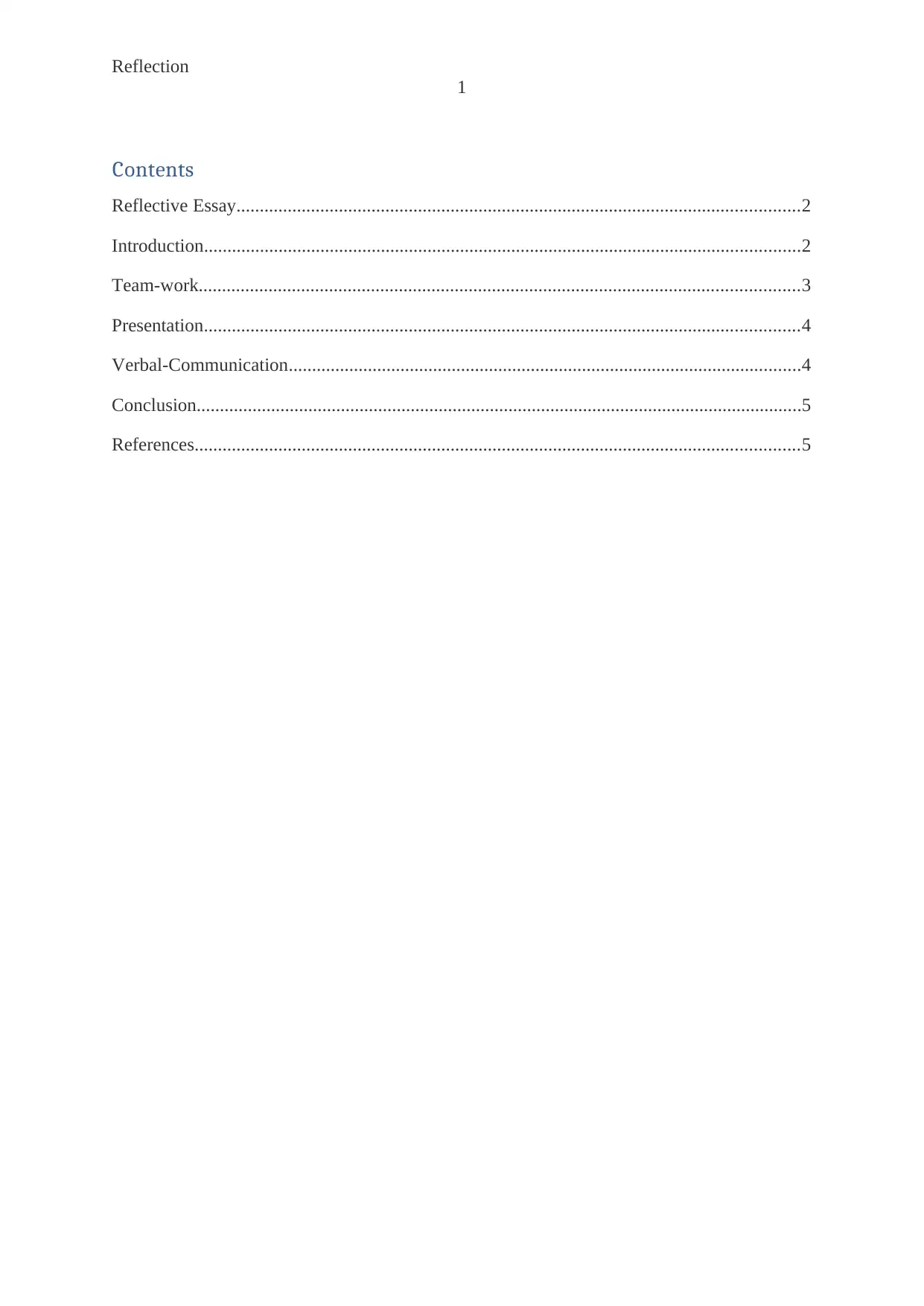
Reflection
1
Contents
Reflective Essay.........................................................................................................................2
Introduction................................................................................................................................2
Team-work.................................................................................................................................3
Presentation................................................................................................................................4
Verbal-Communication..............................................................................................................4
Conclusion..................................................................................................................................5
References..................................................................................................................................5
1
Contents
Reflective Essay.........................................................................................................................2
Introduction................................................................................................................................2
Team-work.................................................................................................................................3
Presentation................................................................................................................................4
Verbal-Communication..............................................................................................................4
Conclusion..................................................................................................................................5
References..................................................................................................................................5
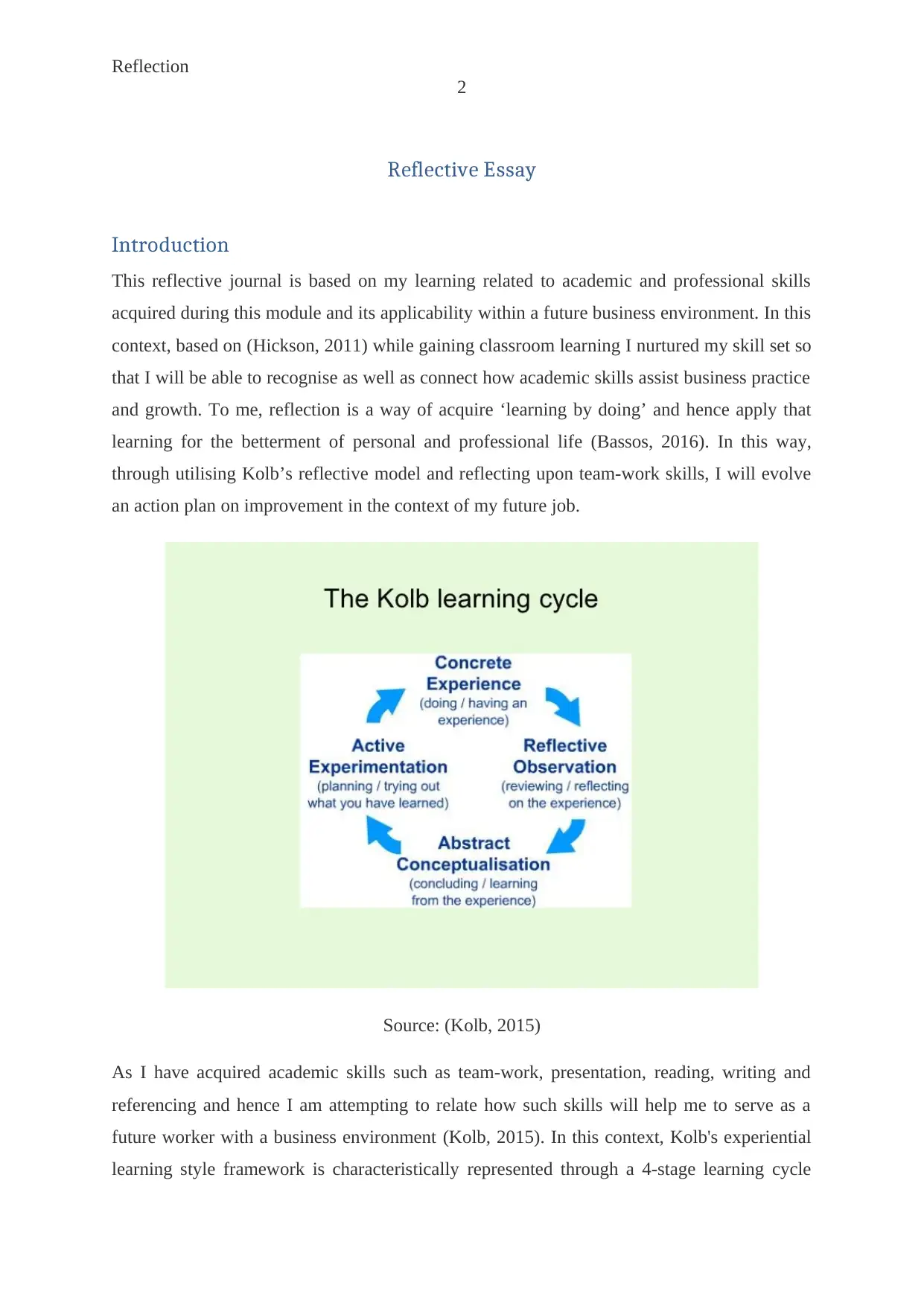
Reflection
2
Reflective Essay
Introduction
This reflective journal is based on my learning related to academic and professional skills
acquired during this module and its applicability within a future business environment. In this
context, based on (Hickson, 2011) while gaining classroom learning I nurtured my skill set so
that I will be able to recognise as well as connect how academic skills assist business practice
and growth. To me, reflection is a way of acquire ‘learning by doing’ and hence apply that
learning for the betterment of personal and professional life (Bassos, 2016). In this way,
through utilising Kolb’s reflective model and reflecting upon team-work skills, I will evolve
an action plan on improvement in the context of my future job.
Source: (Kolb, 2015)
As I have acquired academic skills such as team-work, presentation, reading, writing and
referencing and hence I am attempting to relate how such skills will help me to serve as a
future worker with a business environment (Kolb, 2015). In this context, Kolb's experiential
learning style framework is characteristically represented through a 4-stage learning cycle
2
Reflective Essay
Introduction
This reflective journal is based on my learning related to academic and professional skills
acquired during this module and its applicability within a future business environment. In this
context, based on (Hickson, 2011) while gaining classroom learning I nurtured my skill set so
that I will be able to recognise as well as connect how academic skills assist business practice
and growth. To me, reflection is a way of acquire ‘learning by doing’ and hence apply that
learning for the betterment of personal and professional life (Bassos, 2016). In this way,
through utilising Kolb’s reflective model and reflecting upon team-work skills, I will evolve
an action plan on improvement in the context of my future job.
Source: (Kolb, 2015)
As I have acquired academic skills such as team-work, presentation, reading, writing and
referencing and hence I am attempting to relate how such skills will help me to serve as a
future worker with a business environment (Kolb, 2015). In this context, Kolb's experiential
learning style framework is characteristically represented through a 4-stage learning cycle
⊘ This is a preview!⊘
Do you want full access?
Subscribe today to unlock all pages.

Trusted by 1+ million students worldwide
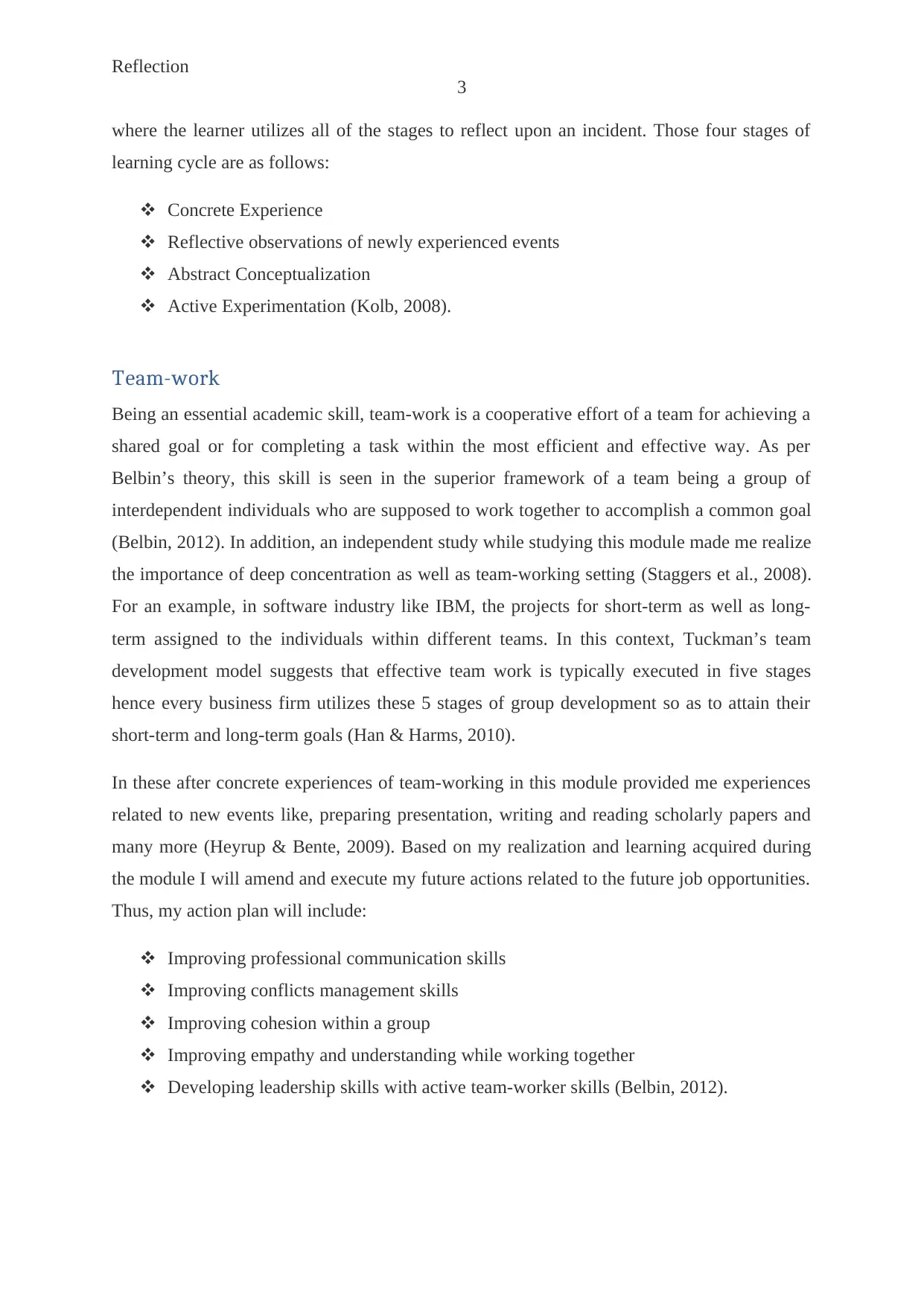
Reflection
3
where the learner utilizes all of the stages to reflect upon an incident. Those four stages of
learning cycle are as follows:
Concrete Experience
Reflective observations of newly experienced events
Abstract Conceptualization
Active Experimentation (Kolb, 2008).
Team-work
Being an essential academic skill, team-work is a cooperative effort of a team for achieving a
shared goal or for completing a task within the most efficient and effective way. As per
Belbin’s theory, this skill is seen in the superior framework of a team being a group of
interdependent individuals who are supposed to work together to accomplish a common goal
(Belbin, 2012). In addition, an independent study while studying this module made me realize
the importance of deep concentration as well as team-working setting (Staggers et al., 2008).
For an example, in software industry like IBM, the projects for short-term as well as long-
term assigned to the individuals within different teams. In this context, Tuckman’s team
development model suggests that effective team work is typically executed in five stages
hence every business firm utilizes these 5 stages of group development so as to attain their
short-term and long-term goals (Han & Harms, 2010).
In these after concrete experiences of team-working in this module provided me experiences
related to new events like, preparing presentation, writing and reading scholarly papers and
many more (Heyrup & Bente, 2009). Based on my realization and learning acquired during
the module I will amend and execute my future actions related to the future job opportunities.
Thus, my action plan will include:
Improving professional communication skills
Improving conflicts management skills
Improving cohesion within a group
Improving empathy and understanding while working together
Developing leadership skills with active team-worker skills (Belbin, 2012).
3
where the learner utilizes all of the stages to reflect upon an incident. Those four stages of
learning cycle are as follows:
Concrete Experience
Reflective observations of newly experienced events
Abstract Conceptualization
Active Experimentation (Kolb, 2008).
Team-work
Being an essential academic skill, team-work is a cooperative effort of a team for achieving a
shared goal or for completing a task within the most efficient and effective way. As per
Belbin’s theory, this skill is seen in the superior framework of a team being a group of
interdependent individuals who are supposed to work together to accomplish a common goal
(Belbin, 2012). In addition, an independent study while studying this module made me realize
the importance of deep concentration as well as team-working setting (Staggers et al., 2008).
For an example, in software industry like IBM, the projects for short-term as well as long-
term assigned to the individuals within different teams. In this context, Tuckman’s team
development model suggests that effective team work is typically executed in five stages
hence every business firm utilizes these 5 stages of group development so as to attain their
short-term and long-term goals (Han & Harms, 2010).
In these after concrete experiences of team-working in this module provided me experiences
related to new events like, preparing presentation, writing and reading scholarly papers and
many more (Heyrup & Bente, 2009). Based on my realization and learning acquired during
the module I will amend and execute my future actions related to the future job opportunities.
Thus, my action plan will include:
Improving professional communication skills
Improving conflicts management skills
Improving cohesion within a group
Improving empathy and understanding while working together
Developing leadership skills with active team-worker skills (Belbin, 2012).
Paraphrase This Document
Need a fresh take? Get an instant paraphrase of this document with our AI Paraphraser
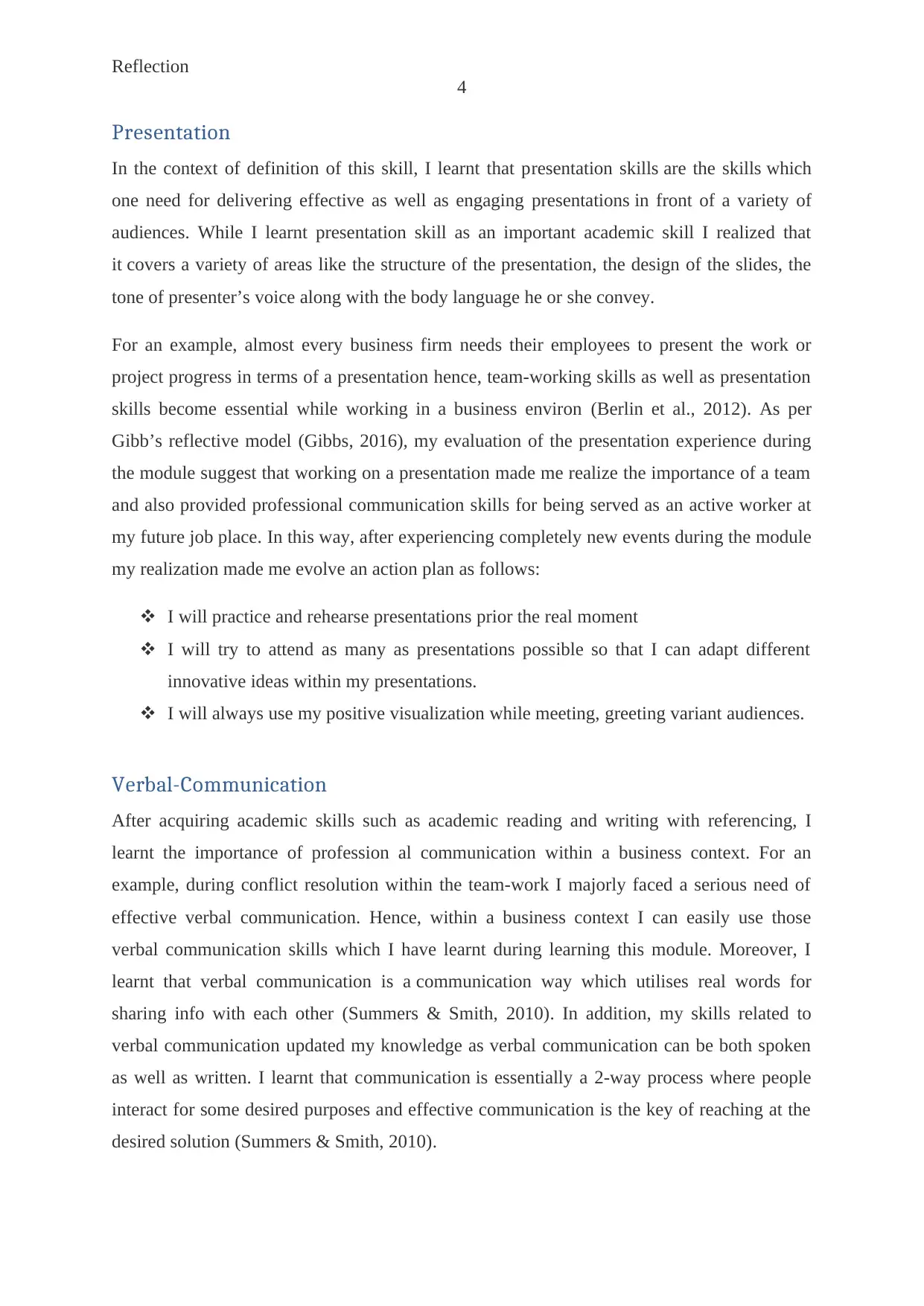
Reflection
4
Presentation
In the context of definition of this skill, I learnt that presentation skills are the skills which
one need for delivering effective as well as engaging presentations in front of a variety of
audiences. While I learnt presentation skill as an important academic skill I realized that
it covers a variety of areas like the structure of the presentation, the design of the slides, the
tone of presenter’s voice along with the body language he or she convey.
For an example, almost every business firm needs their employees to present the work or
project progress in terms of a presentation hence, team-working skills as well as presentation
skills become essential while working in a business environ (Berlin et al., 2012). As per
Gibb’s reflective model (Gibbs, 2016), my evaluation of the presentation experience during
the module suggest that working on a presentation made me realize the importance of a team
and also provided professional communication skills for being served as an active worker at
my future job place. In this way, after experiencing completely new events during the module
my realization made me evolve an action plan as follows:
I will practice and rehearse presentations prior the real moment
I will try to attend as many as presentations possible so that I can adapt different
innovative ideas within my presentations.
I will always use my positive visualization while meeting, greeting variant audiences.
Verbal-Communication
After acquiring academic skills such as academic reading and writing with referencing, I
learnt the importance of profession al communication within a business context. For an
example, during conflict resolution within the team-work I majorly faced a serious need of
effective verbal communication. Hence, within a business context I can easily use those
verbal communication skills which I have learnt during learning this module. Moreover, I
learnt that verbal communication is a communication way which utilises real words for
sharing info with each other (Summers & Smith, 2010). In addition, my skills related to
verbal communication updated my knowledge as verbal communication can be both spoken
as well as written. I learnt that communication is essentially a 2-way process where people
interact for some desired purposes and effective communication is the key of reaching at the
desired solution (Summers & Smith, 2010).
4
Presentation
In the context of definition of this skill, I learnt that presentation skills are the skills which
one need for delivering effective as well as engaging presentations in front of a variety of
audiences. While I learnt presentation skill as an important academic skill I realized that
it covers a variety of areas like the structure of the presentation, the design of the slides, the
tone of presenter’s voice along with the body language he or she convey.
For an example, almost every business firm needs their employees to present the work or
project progress in terms of a presentation hence, team-working skills as well as presentation
skills become essential while working in a business environ (Berlin et al., 2012). As per
Gibb’s reflective model (Gibbs, 2016), my evaluation of the presentation experience during
the module suggest that working on a presentation made me realize the importance of a team
and also provided professional communication skills for being served as an active worker at
my future job place. In this way, after experiencing completely new events during the module
my realization made me evolve an action plan as follows:
I will practice and rehearse presentations prior the real moment
I will try to attend as many as presentations possible so that I can adapt different
innovative ideas within my presentations.
I will always use my positive visualization while meeting, greeting variant audiences.
Verbal-Communication
After acquiring academic skills such as academic reading and writing with referencing, I
learnt the importance of profession al communication within a business context. For an
example, during conflict resolution within the team-work I majorly faced a serious need of
effective verbal communication. Hence, within a business context I can easily use those
verbal communication skills which I have learnt during learning this module. Moreover, I
learnt that verbal communication is a communication way which utilises real words for
sharing info with each other (Summers & Smith, 2010). In addition, my skills related to
verbal communication updated my knowledge as verbal communication can be both spoken
as well as written. I learnt that communication is essentially a 2-way process where people
interact for some desired purposes and effective communication is the key of reaching at the
desired solution (Summers & Smith, 2010).
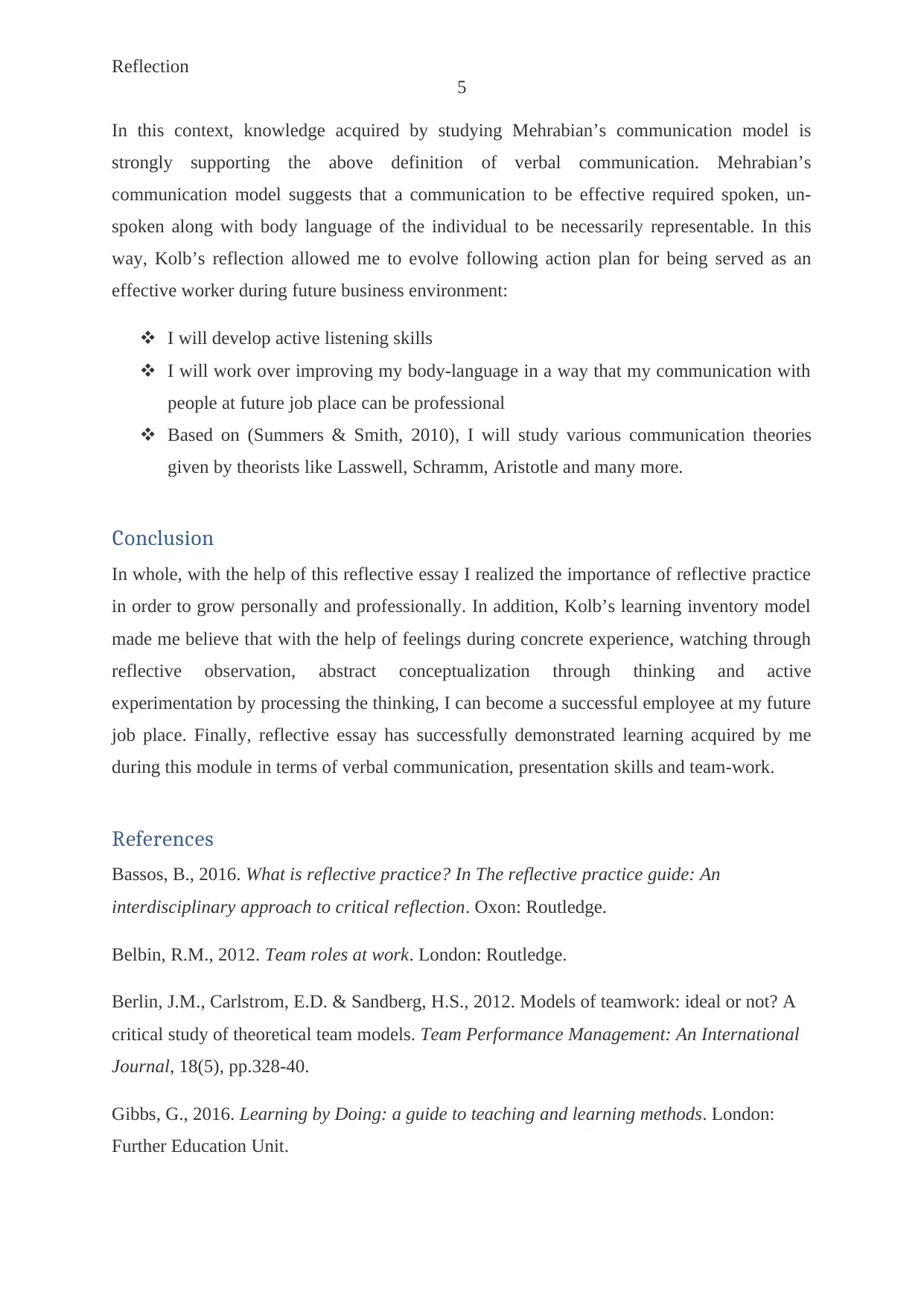
Reflection
5
In this context, knowledge acquired by studying Mehrabian’s communication model is
strongly supporting the above definition of verbal communication. Mehrabian’s
communication model suggests that a communication to be effective required spoken, un-
spoken along with body language of the individual to be necessarily representable. In this
way, Kolb’s reflection allowed me to evolve following action plan for being served as an
effective worker during future business environment:
I will develop active listening skills
I will work over improving my body-language in a way that my communication with
people at future job place can be professional
Based on (Summers & Smith, 2010), I will study various communication theories
given by theorists like Lasswell, Schramm, Aristotle and many more.
Conclusion
In whole, with the help of this reflective essay I realized the importance of reflective practice
in order to grow personally and professionally. In addition, Kolb’s learning inventory model
made me believe that with the help of feelings during concrete experience, watching through
reflective observation, abstract conceptualization through thinking and active
experimentation by processing the thinking, I can become a successful employee at my future
job place. Finally, reflective essay has successfully demonstrated learning acquired by me
during this module in terms of verbal communication, presentation skills and team-work.
References
Bassos, B., 2016. What is reflective practice? In The reflective practice guide: An
interdisciplinary approach to critical reflection. Oxon: Routledge.
Belbin, R.M., 2012. Team roles at work. London: Routledge.
Berlin, J.M., Carlstrom, E.D. & Sandberg, H.S., 2012. Models of teamwork: ideal or not? A
critical study of theoretical team models. Team Performance Management: An International
Journal, 18(5), pp.328-40.
Gibbs, G., 2016. Learning by Doing: a guide to teaching and learning methods. London:
Further Education Unit.
5
In this context, knowledge acquired by studying Mehrabian’s communication model is
strongly supporting the above definition of verbal communication. Mehrabian’s
communication model suggests that a communication to be effective required spoken, un-
spoken along with body language of the individual to be necessarily representable. In this
way, Kolb’s reflection allowed me to evolve following action plan for being served as an
effective worker during future business environment:
I will develop active listening skills
I will work over improving my body-language in a way that my communication with
people at future job place can be professional
Based on (Summers & Smith, 2010), I will study various communication theories
given by theorists like Lasswell, Schramm, Aristotle and many more.
Conclusion
In whole, with the help of this reflective essay I realized the importance of reflective practice
in order to grow personally and professionally. In addition, Kolb’s learning inventory model
made me believe that with the help of feelings during concrete experience, watching through
reflective observation, abstract conceptualization through thinking and active
experimentation by processing the thinking, I can become a successful employee at my future
job place. Finally, reflective essay has successfully demonstrated learning acquired by me
during this module in terms of verbal communication, presentation skills and team-work.
References
Bassos, B., 2016. What is reflective practice? In The reflective practice guide: An
interdisciplinary approach to critical reflection. Oxon: Routledge.
Belbin, R.M., 2012. Team roles at work. London: Routledge.
Berlin, J.M., Carlstrom, E.D. & Sandberg, H.S., 2012. Models of teamwork: ideal or not? A
critical study of theoretical team models. Team Performance Management: An International
Journal, 18(5), pp.328-40.
Gibbs, G., 2016. Learning by Doing: a guide to teaching and learning methods. London:
Further Education Unit.
⊘ This is a preview!⊘
Do you want full access?
Subscribe today to unlock all pages.

Trusted by 1+ million students worldwide
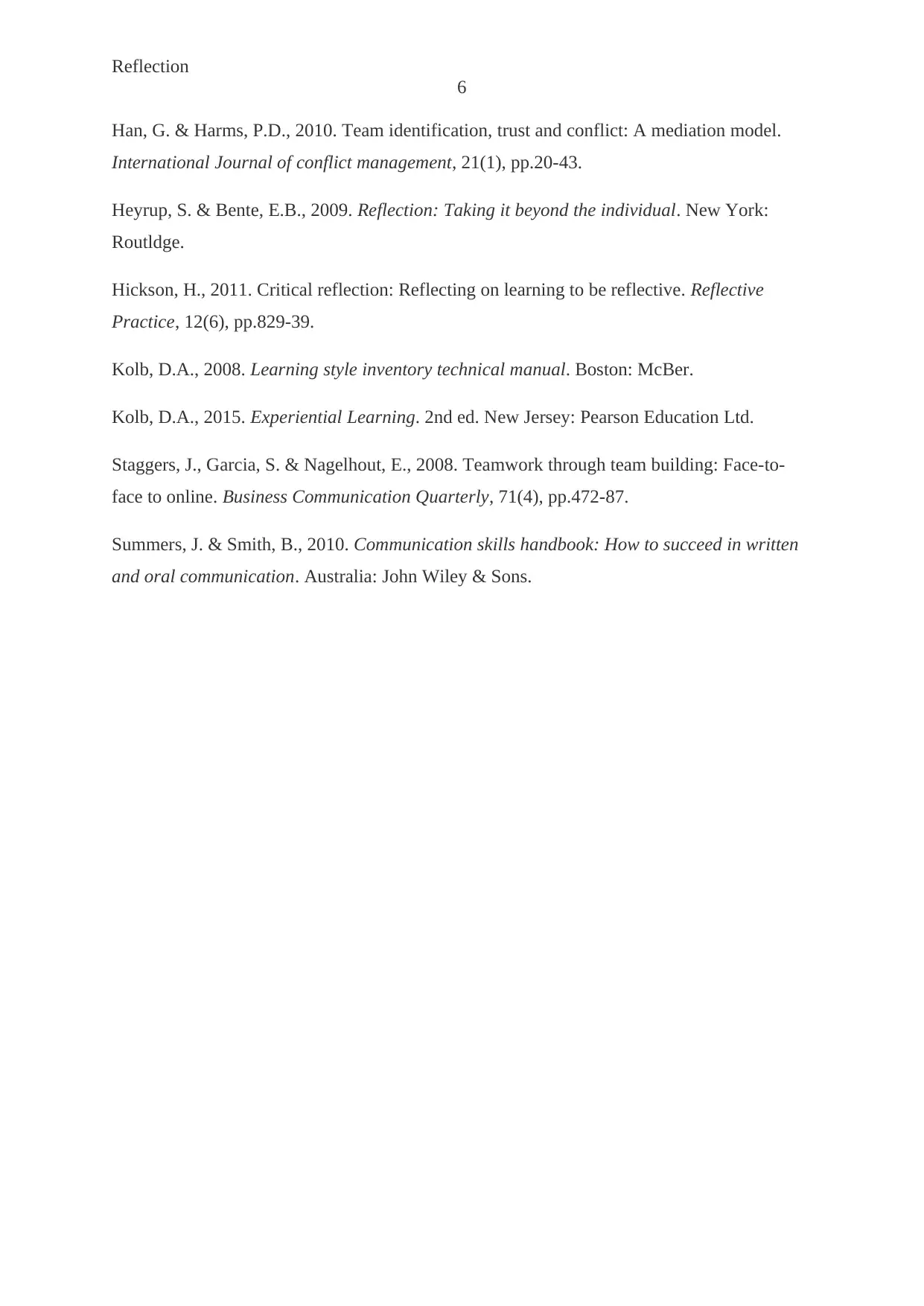
Reflection
6
Han, G. & Harms, P.D., 2010. Team identification, trust and conflict: A mediation model.
International Journal of conflict management, 21(1), pp.20-43.
Heyrup, S. & Bente, E.B., 2009. Reflection: Taking it beyond the individual. New York:
Routldge.
Hickson, H., 2011. Critical reflection: Reflecting on learning to be reflective. Reflective
Practice, 12(6), pp.829-39.
Kolb, D.A., 2008. Learning style inventory technical manual. Boston: McBer.
Kolb, D.A., 2015. Experiential Learning. 2nd ed. New Jersey: Pearson Education Ltd.
Staggers, J., Garcia, S. & Nagelhout, E., 2008. Teamwork through team building: Face-to-
face to online. Business Communication Quarterly, 71(4), pp.472-87.
Summers, J. & Smith, B., 2010. Communication skills handbook: How to succeed in written
and oral communication. Australia: John Wiley & Sons.
6
Han, G. & Harms, P.D., 2010. Team identification, trust and conflict: A mediation model.
International Journal of conflict management, 21(1), pp.20-43.
Heyrup, S. & Bente, E.B., 2009. Reflection: Taking it beyond the individual. New York:
Routldge.
Hickson, H., 2011. Critical reflection: Reflecting on learning to be reflective. Reflective
Practice, 12(6), pp.829-39.
Kolb, D.A., 2008. Learning style inventory technical manual. Boston: McBer.
Kolb, D.A., 2015. Experiential Learning. 2nd ed. New Jersey: Pearson Education Ltd.
Staggers, J., Garcia, S. & Nagelhout, E., 2008. Teamwork through team building: Face-to-
face to online. Business Communication Quarterly, 71(4), pp.472-87.
Summers, J. & Smith, B., 2010. Communication skills handbook: How to succeed in written
and oral communication. Australia: John Wiley & Sons.
1 out of 7
Related Documents
Your All-in-One AI-Powered Toolkit for Academic Success.
+13062052269
info@desklib.com
Available 24*7 on WhatsApp / Email
![[object Object]](/_next/static/media/star-bottom.7253800d.svg)
Unlock your academic potential
Copyright © 2020–2026 A2Z Services. All Rights Reserved. Developed and managed by ZUCOL.




